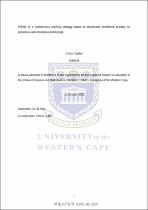| dc.contributor.advisor | May, Bruce | |
| dc.contributor.author | Carelse, Cindy | |
| dc.date.accessioned | 2023-05-16T09:01:33Z | |
| dc.date.available | 2023-05-16T09:01:33Z | |
| dc.date.issued | 2022 | |
| dc.identifier.uri | http://hdl.handle.net/11394/9997 | |
| dc.description | Magister Educationis - MEd | en_US |
| dc.description.abstract | This study investigated the effects a teaching strategy based on interleaved distributed practice had on learners in three grade 6 classes’ procedural and conceptual knowledge within a, previously disadvantaged, Cape Town Primary School. An inference one can draw from the pace setters of the South African Curriculum (CAPS) is that mass practice is the suggested practice type. Mass practice is a teaching strategy where learners would practice problems requiring one or more specific skill(s) immediately after the presented lesson on that skill(s). The aforementioned practice allowed learners to predict the type of problems they would encounter in these activities. The interleaved distributed practice presents an alternative teaching strategy to massed practice. | en_US |
| dc.language.iso | en | en_US |
| dc.publisher | University of the Western Cape | en_US |
| dc.subject | Teaching and Learning | en_US |
| dc.subject | Mathematics teaching | en_US |
| dc.subject | South Africa | en_US |
| dc.subject | Primary school | en_US |
| dc.subject | CAPS | en_US |
| dc.title | Effects of a mathematics teaching strategy based on distributed interleaved practice on procedural and conceptual knowledge | en_US |
| dc.rights.holder | University of the Western Cape | en_US |

